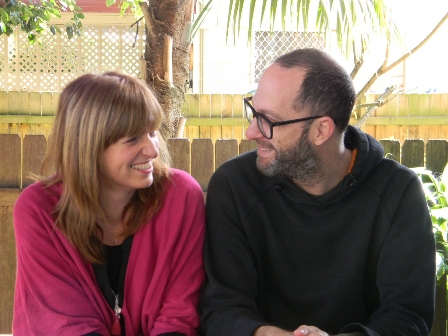This article originally appeared in IF Magazine #148 (August-September).
Tony Krawitz
They were both challenging projects in terms of the geography: Dead Europe was filmed in Australia, Greece, Paris and Budapest; Cate’s Lore was filmed in the German language in five regions across Germany.
Lore was meant to shoot in May/June last year and Dead Europe in October/November but then Lore was put back. I was in denial how difficult it would be. Making films at the same time isn’t recommended for couples with kids!
Our son Jonathan went to school in Berlin and, during his Easter break, I took him with me on a recce to Greece for two weeks. He also spent six weeks working as video split operator and clapper loader on Cate’s film, which ended up starting in early-July. He loved it.
I came back to Australia with the kids in the last three weeks of the Lore shoot and when Cate got back we were together for about four days before I went back to Europe. We didn’t have anywhere to live in Sydney and were looking for somewhere to rent.
The producer of both films, Liz Watts, and I were away for seven weeks on Dead Europe, going from city to city and picking up cast and crew along the way. I’d film all day and get on Skype at night to talk to casting agents, rehearse actors, check locations for the schedule ahead. It wasn’t ideal but all that nervous energy went into the film I think. And we were going for a documentary-realist style.
To work with Greek and French and Hungarian crews as well as Australians was really liberating. I was born in Johannesburg – Cate and I married there in 2009 – but my grandparents were from Europe and I feel very European. Dead Europe looks at historical and contemporary hatred, but at its heart it is about anti-Semitism within the protagonist’s family.
Christos [Christos Tsolkos, writer of the novel Dead Europe] had a non-Jewish perspective, whereas I am Jewish. What really interested me was how hatred can unravel someone psychologically. Cate is really amazing on story and character and writing. All through the drafting process we talked about what was and wasn’t working. I feel really lucky we are both directors and have someone to bounce ideas off; not only scripts but actors, design, cinematography, sound, music – every aspect of filmmaking.
I produced Strap On Olympia, the first film Cate directed – we have worked really closely on every project since.
Cate Shortland
If both films did not have Liz Watts as one of the producers they would not have happened. She was the lynchpin. I have known her since I was 18 years old – I’m now 43 – and she’s the godmother of one of my children. It was hard for us but it was much harder for her. She didn’t just produce; she also had to manage our complicated family affairs.
She flew my sister to Europe to look after our youngest child, Ruby. I had all my nieces and nephews there at different times. One niece worked on the film. We lived for six months in Berlin and, during pre-production, our flat had all these kids sleeping on the floor. I never would have thought it would be ok but I think I just gave in to the chaos. It had to be ok because it couldn’t not be chaotic.
My film, Lore, is set in 1945, and is about the children of an SS officer [in Adolf Hitler’s Einsatzgruppen] who was deeply involved in the atrocities that happened in Germany during World War II. Not many films are made from the German perspective and mine was about the perpetrators.
Liz gave Tony Lore [the book] as a birthday present. I don’t think she was thinking of it as a film. Paul Welsh, a Scottish producer, initiated the project. He gave me the book at the Edinburgh Film Festival. Neither Tony nor I had read it at that time.
You are always frightened going into a film but I was extra frightened because of the themes. I knew I had to go to a very dark place and Tony gave me a lot of strength. He encouraged me to be true to the heart of the material [Rachel Seiffert’s The Dark Room, made up of linked novellas], ask the hard questions and not shy away from the difficult issues. His family are German Jews and this was important to me – and it helped. His grandmother left Germany in 1935. We are very close to her.
The film is about what it’s like when the people you love lie to you, when society lies to you. As a white Australian whose ancestors were on the First Fleet and whose great, great, great grandfather was involved in exploration and had some first contact with indigenous Australians, the themes felt close to me.
When I made Somersault there was a climate of fear about the industry and making films here. I didn’t want to be a filmmaker after that. Now I feel as though we can make films anywhere and I can’t wait to make another.
Tony and I both love television and would like to come up with an idea we’re both passionate about and develop it into a miniseries. I say we are not allowed to talk about film when the children are there, when we’re having dinner or when we have friends over, many of whom are not filmmakers. I find it too consuming if your whole life is about film when it should be about living your life.
Lore is released on September 20 and Dead Europe on November 1.


